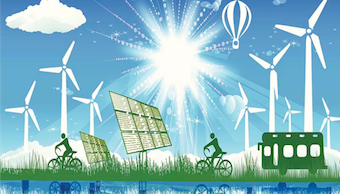 The twin goals of environmental stewardship and energy sustainability provide our country and the world with two of the most pressing challenges of modern times. The overwhelming dependence of the world on fossil fuels has led to energy security, equity, and air and water quality problems in addition to the destabilizing effects of global climate change. Essentially all scientific leaders in the world now agree that the climate is changing and that our dependence on burning fossil fuels is the dominant cause.
The twin goals of environmental stewardship and energy sustainability provide our country and the world with two of the most pressing challenges of modern times. The overwhelming dependence of the world on fossil fuels has led to energy security, equity, and air and water quality problems in addition to the destabilizing effects of global climate change. Essentially all scientific leaders in the world now agree that the climate is changing and that our dependence on burning fossil fuels is the dominant cause.
It can be argued that society has many of the technologies it needs to meet environmental and energy challenges, but better public policy is crucial to ensuring their adoption and widespread use. Through case studies and economic analysis, this focus area illustrates the value of designing policy mechanisms that match the socio-technical nature of the barriers facing cleaner systems and technologies. Since many energy and climate-related decisions are fraught with deep uncertainties, it is not sufficient to evaluate static policy interventions. New knowledge about environmental conditions, energy resources, technologies and social systems need to be iteratively assimilated into governance approaches.
Principles of participatory democracy and conflict resolution are also taught as important features of effective environmental and energy policy. While intervention by governments is important, it is often much more effective when implemented at a variety of scales in cooperation with a plurality of actors, in partnership with stakeholder groups, cities, and corporations.
